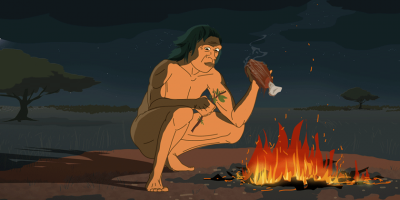
Eating meat is what made us human. At least, that's one of the leading theories to explain how our brains got so big. The theory says that our human ancestors evolved bigger brains as a result of switching from a plant-based to a nutrient-rich meat diet. But earlier this year a Smithsonian researcher discovered that this theory may not have as much meat on its bones as previously believed.
Guests:
- Briana Pobiner, paleoanthropologist; research scientist and museum educator with the Human Origins Program at the Smithsonian's National Museum of Natural History
- Becky Malinsky, curator of primates, Smithsonian's National Zoo and Conservation Biology Institute
- Andrew Barr, paleoanthropologist; assistant professor of anthropology, The George Washington University
Smithsonian Links:
- Learn more about our early ancestors with Human Origins Initiative at the Smithsonian’s National Museum of Natural History.
- Explore an interactive species timeline
- View the digital collections
- Take a narrated virtual tour through the museum’s Hall of Human Origins
- Hear conversations in the HOT (Human Origins Today) Topics series
- Explore the daily lives (and eating habits) of some of the primate species residing at the Smithsonian’s National Zoological Park and Conservation Biology Institute. The zoo’s latest #GorillaStory update features Moke, a rambunctious four-year-old who keeps his entire troop on their toes.
Special Update
Briana Pobiner has made a discovery we couldn't wait to sink our teeth into—what might be the earliest evidence of our human ancestors eating each other. This conversation is a special July 2023 update to this episode. Bon appétit!
Sign up to unlock the full Sidedoor experience!
Get bonus content, news, and updates in your inbox.
